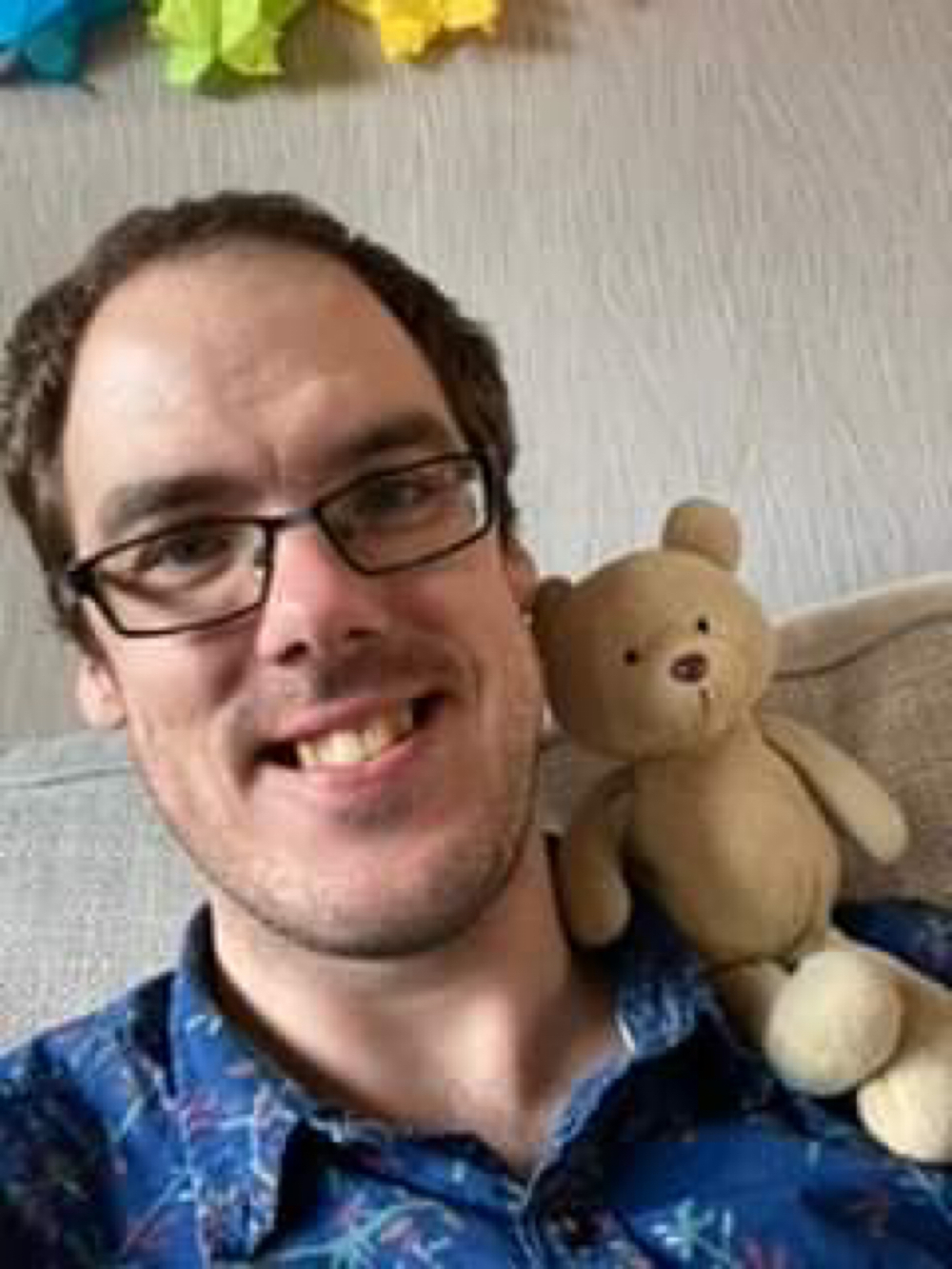Laurence (32), a primary school teacher from Cardiff, shares his experience in living with hydrocephalus and cerebral palsy. Laurence has been living with both these conditions since birth. Hydrocephalus is a condition where fluid is gathered in the brain rather than being absorbed by the body. Treatments for hydrocephalus normally involve a surgical procedure to implant a thin tube into the brain that helps drain away the liquid. Cerebral palsy, a life-long condition, affects movement and posture; therapy and surgery helps to manage the symptoms.
Laurence attended mainstream schools as a child where he received reasonable adjustments such as leaving lessons early to provide him extra time for walking from class to class. Laurence felt protected in primary school, especially as he had a 1-to-1. When tasks are difficult for Laurence, he feels annoyed that he’s unable to do it himself and can feel isolated from others due to his condition. Laurence is conscious of the amount of energy he uses during the day as his condition can not only make him feel exhausted but he also needs to be careful that the fluid in his brain does not build up too much. Now as a teacher, he enjoys providing emotional support to children living with various conditions or illnesses.
When Laurence is feeling frustrated about his condition, he speaks with friends and family. He explained that his emotional strength and well-being would not be as robust as it is without the support network around him. Taking a nap is extremely important for Laurence to recover from the workload of the day. In addition, he spends a lot of time researching the history of his family tree. Reading and watching sport both provide Laurence the escapism he needs from his condition. Laurence has also found support networks such as coffee morning groups for people living with similar conditions. It is reassuring for Laurence knowing there is additional accessible support available if and when he requires it.
Stori Laurence:
Mae Laurence (32), athrawes ysgol gynradd o Gaerdydd, yn rhannu ei brofiad o fyw gyda hydroseffalws a pharlys yr ymennydd. Mae Laurence wedi bod yn byw gyda’r ddau gyflwr hyn ers ei eni. Mae hydroseffalws yn gyflwr lle mae hylif yn cael ei gasglu yn yr ymennydd yn hytrach na chael ei amsugno gan y corff. Mae triniaethau ar gyfer hydroseffalws fel arfer yn cynnwys llawdriniaeth i fewnblannu tiwb tenau i’r ymennydd sy’n helpu i ddraenio’r hylif. Mae parlys yr ymennydd, cyflwr gydol oes, yn effeithio ar symudiad ac osgo; mae therapi a llawdriniaeth yn helpu i reoli’r symptomau.
Mynychodd Laurence ysgolion prif ffrwd fel plentyn lle cafodd addasiadau rhesymol fel gadael gwersi’n gynnar i roi amser ychwanegol iddo gerdded o ddosbarth i ddosbarth. Roedd Laurence yn teimlo ei fod yn cael ei warchod yn yr ysgol gynradd, yn enwedig gan fod ganddo 1-i-1. Pan fydd tasgau’n anodd i Laurence, mae’n teimlo’n flin nad yw’n gallu gwneud hynny ei hun a gall deimlo’n ynysig oddi wrth eraill oherwydd ei gyflwr. Mae Laurence yn ymwybodol o faint o ynni y mae ei’n defnyddio yn ystod y dydd, oherwydd gall ei gyflwr nid yn unig wneud iddo deimlo’n flinedig ond mae angen iddo hefyd fod yn ofalus nad yw’r hylif yn ei ymennydd yn cronni gormod. Bellach, fel athro, mae’n mwynhau darparu cymorth emosiynol i blant sy’n byw gyda chyflyrau neu salwch amrywiol.
Pan mae Laurence yn teimlo’n rhwystredig am ei gyflwr, mae’n siarad â ffrindiau a theulu. Esboniodd na fyddai ei gryfder emosiynol a’i les mor gadarn ag y mae heb y rhwydwaith cymorth o’i gwmpas. Mae cymryd cwsg bach yn hynod o bwysig i Laurence wella o lwyth gwaith y dydd. Yn ogystal, mae’n treulio llawer o amser yn ymchwilio i hanes ei goeden achau. Mae darllen a gwylio chwaraeon ill dau yn rhoi’r ddihangfa sydd ei hangen arno i Laurence o’i gyflwr. Mae Laurence hefyd wedi dod o hyd i rwydweithiau cymorth fel grwpiau bore coffi ar gyfer pobl eraill sy’n byw gyda chyflyrau tebyg. Mae’n galonogol i Laurence wybod bod cymorth hygyrch ychwanegol ar gael os a phan fydd ei angen.
*this interview was conducted through the medium of English, thereafter, translated to Welsh

